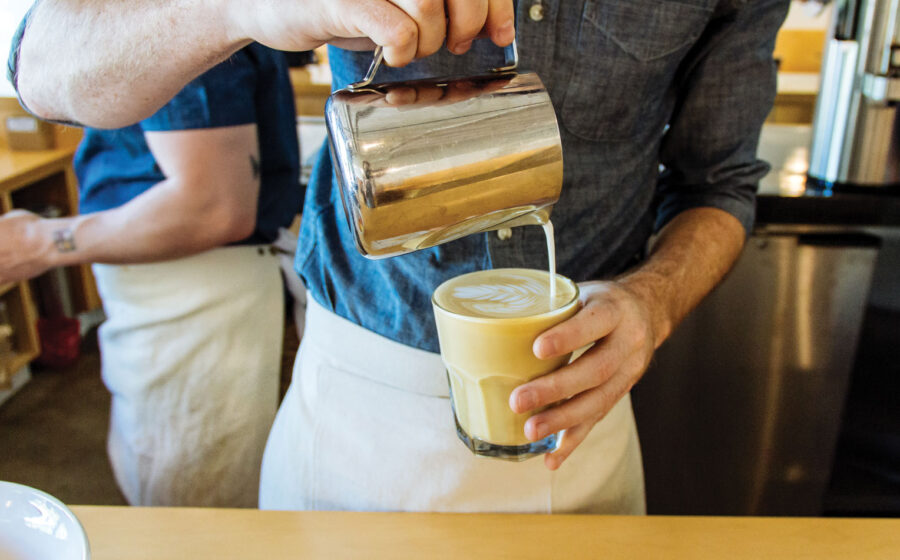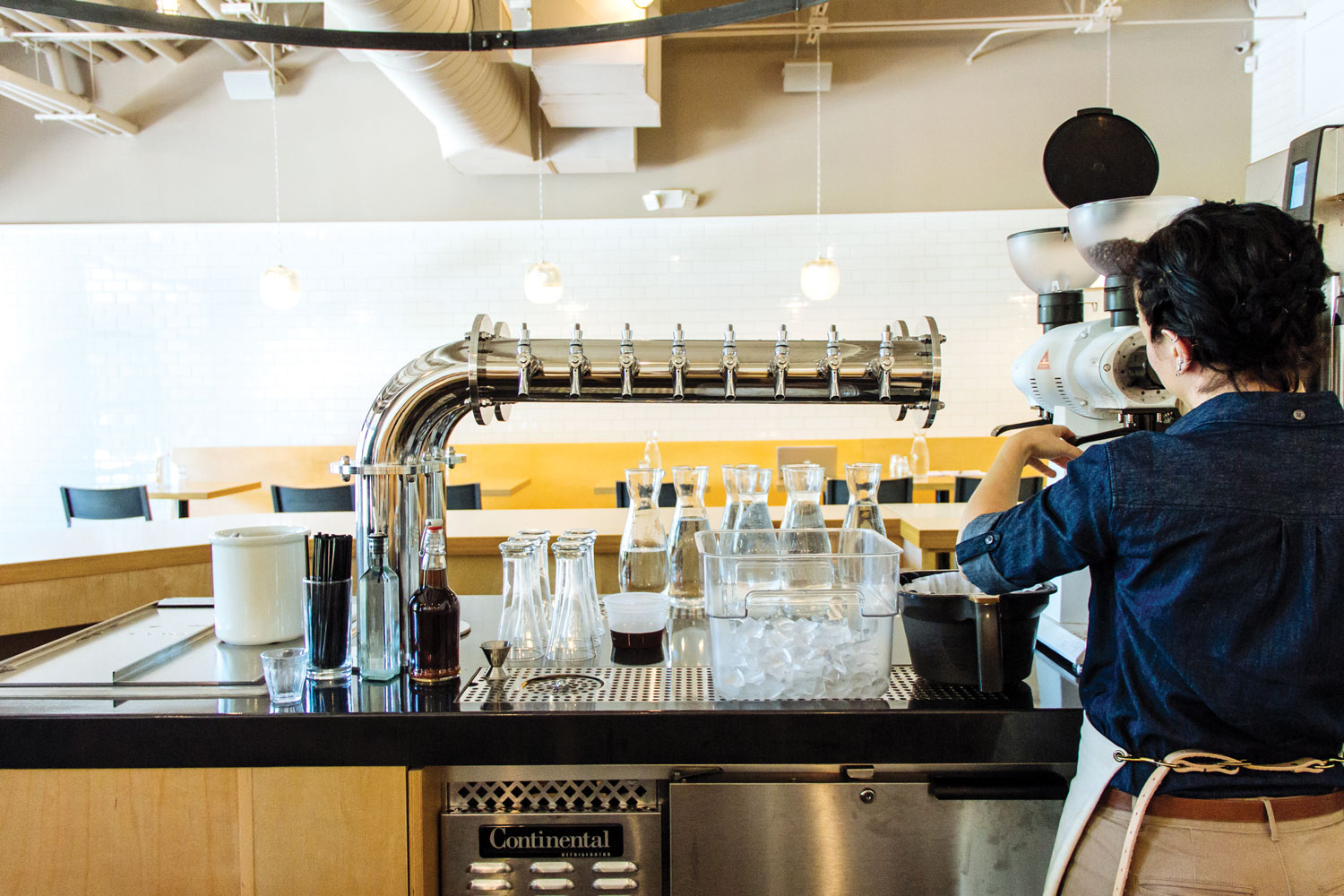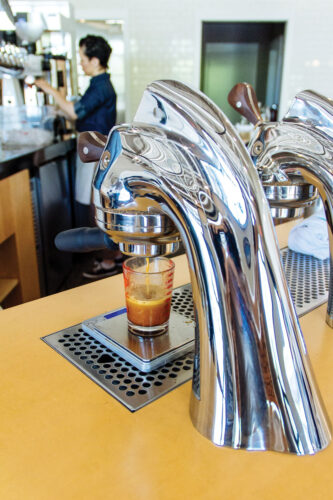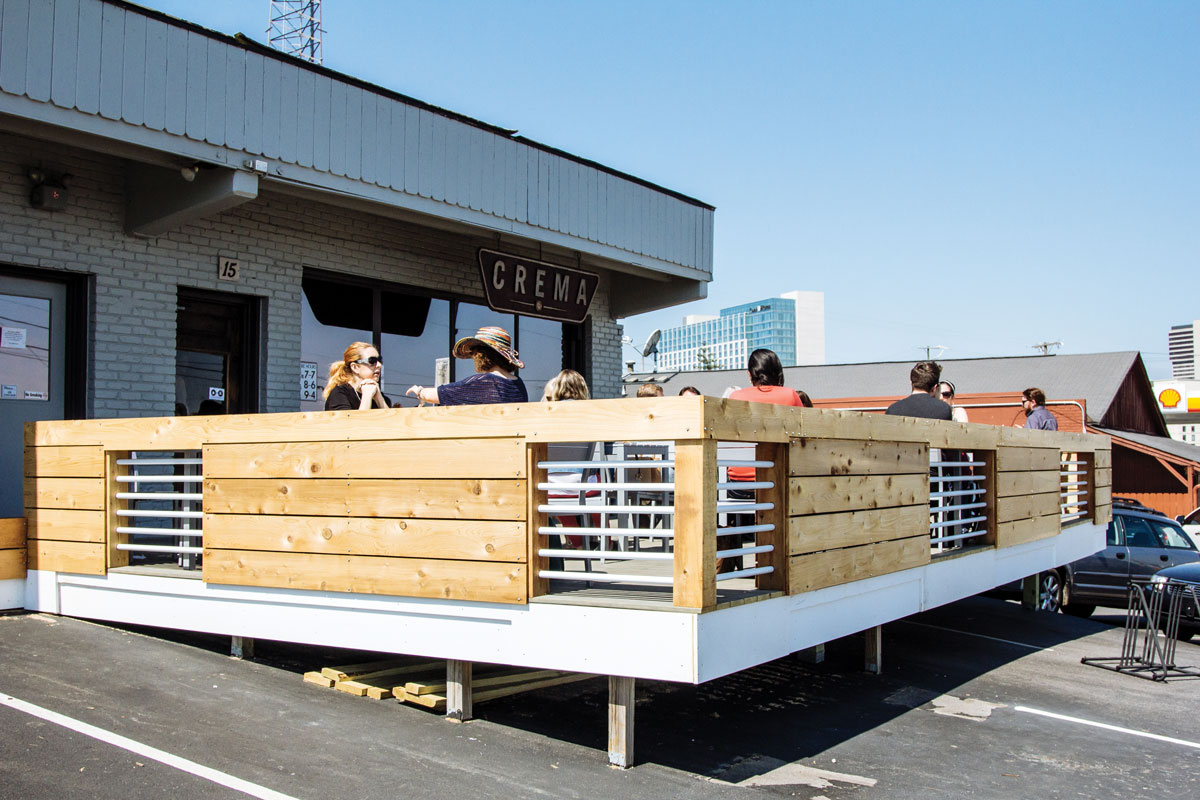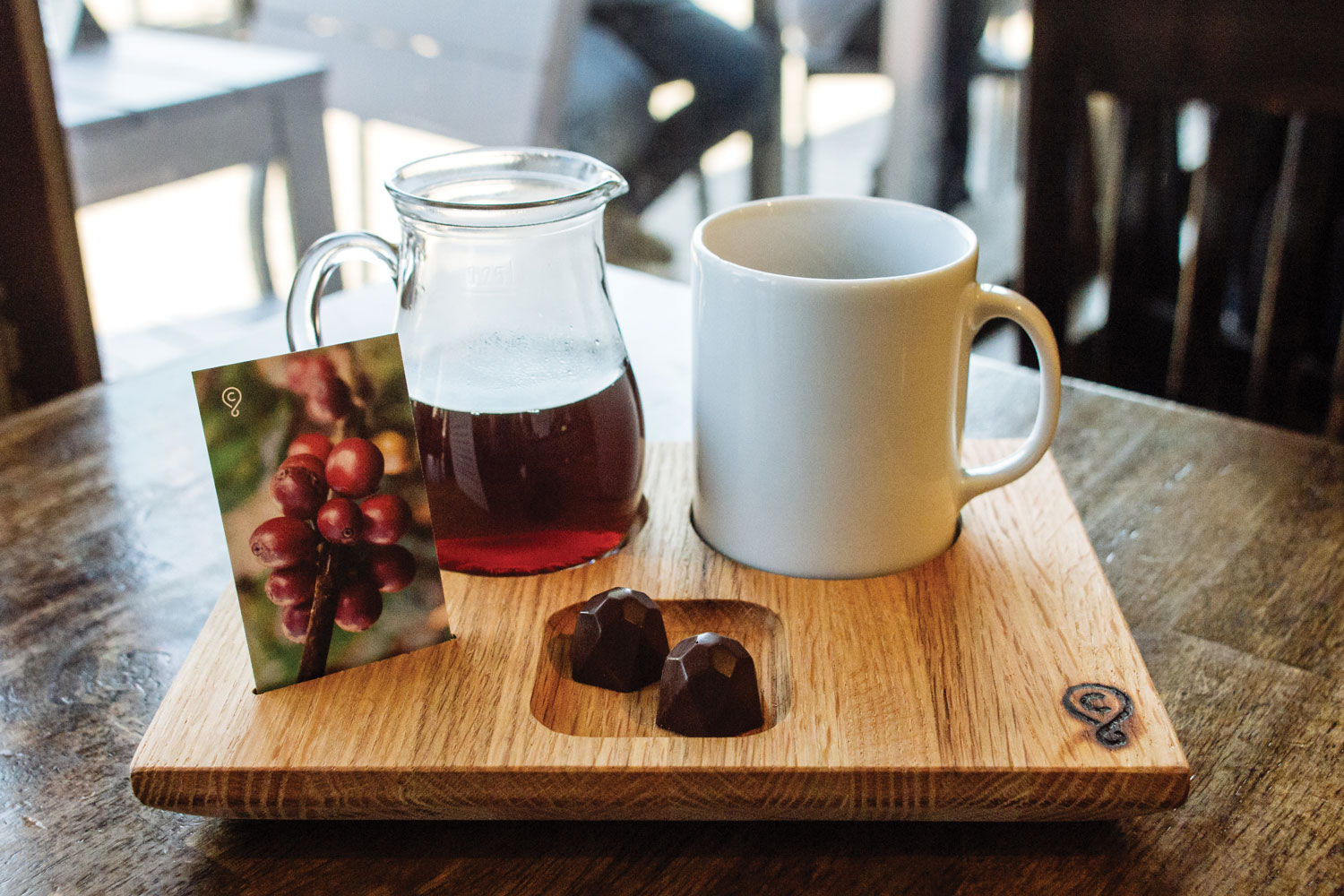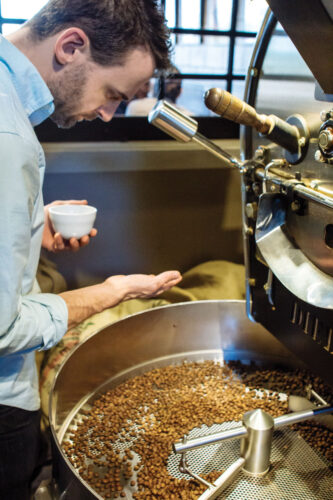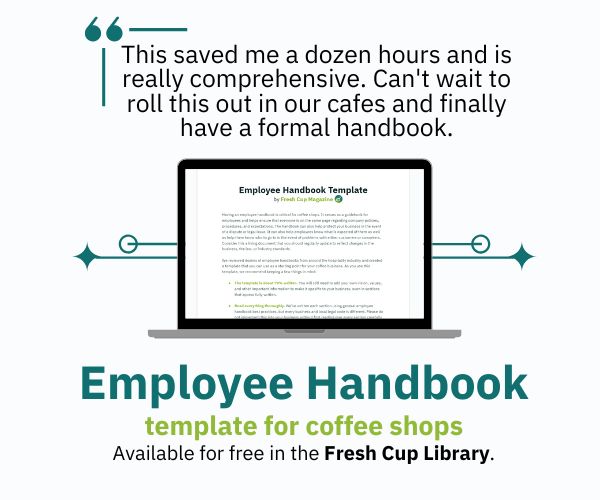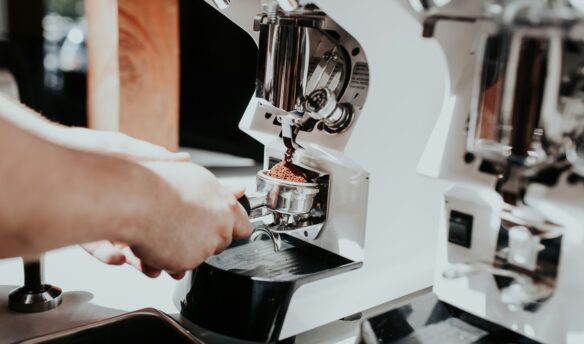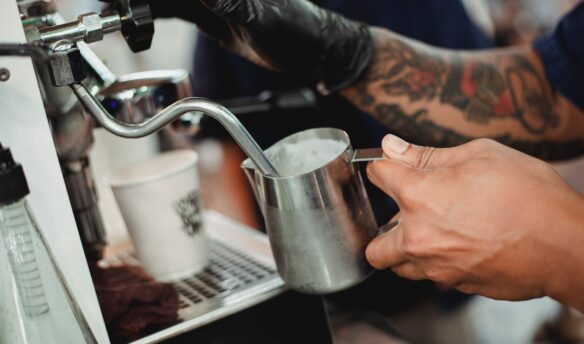[I] moved here for music and I got burnt out on it, but I still wanted to do something creative,” says Winston Harrison, certified Q grader and head roaster at Nashville’s Crema Coffee Roasters. Harrison’s story is a familiar one in Nashville. As one might expect from a place nicknamed Music City, Nashville has long been a destination for aspiring musicians. This same mixture of creativity and ambition is shared by a young group of baristas and entrepreneurs who are taking coffee culture to heights previously unseen south of the Mason-Dixon. Thanks in part to a booming medical research industry, and the longstanding music scene, Nashville’s population is young and well-traveled, with expendable income and a taste for finer things. The surplus of demand has led to a recent surge of new cafés and restaurants.
Nashville’s population is young and well-traveled, with expendable income and a taste for finer things.
“It can’t open fast enough,” says Nathanael Mehrens, co-owner of Nashville’s newest café, Steadfast Coffee. “And the quality can’t be high enough,” says Jamie Cunningham, one of Mehrens’ three business partners. Mehrens and Cunningham are referring to the Nashville culinary scene at large, but one wonders if it doesn’t serve as a mantra for the young start up. For the last six months, Steadfast Coffee has operated as a pop-up café in the Skillery, a shared workspace in Nashville’s Germantown neighborhood. The time has given the team at Steadfast an opportunity to establish their company and get to know their neighbors as they put the finishing touches on their full café, which is conveniently located behind their pop-up. The café will feature twin Modbar stations for espresso, sixteen craft beer taps, and a full menu developed by Julia Sullivan, an up-and-coming chef whose CV includes New York’s three-Michelin-starred Per Se. Initially, coffee will be provided by Seattle’s Slate Coffee Roasters, though a Steadfast roastery is being built in nearby Franklin. The roasting side of the venture is spearheaded by a partner, Sean Stewart, the third-place finisher at the 2013 US Brewers Cup.
“We want to be the sort of place where the customer feels like the star,” says Cunningham. For Steadfast, this means designing a customer experience in which hospitality receives equal priority with beverage quality. Taking a cue from cafés such as Los Angeles’s Go Get Em Tiger, the coffee program will focus on autodrip filter coffee and volumetrically brewed espresso. The focus on speed and efficiency frees up the staff to take care of customers. “Humans are good at empathy,” says Mehrens. “Machines are good at making a repeatable product.”
This philosophy comes from years of specialty coffee experience. Cunningham previously oversaw quality and education at Bongo Java, an early pioneer in Nashville coffee that boasts five locations around the city. Mehrens and Stewart credit earning their Barista Guild of America certifications in 2009 as the pivotal moment in their coffee careers. They would both go on to work at Crema and then start the consulting and catering company Beve Mobile Coffee. “We don’t want to just ride on other people’s coattails. We want to blaze some new trails,” says Cunningham.
Outside of Tennessee, Nashville’s coffee scene is probably best known as the home of Barista Parlor. With celebrity backers, designer furniture, and an enviable arsenal of equipment, the pair of cafés has attracted international attention. Whether it’s the Japanese cold-brew towers, the Slayer Espresso Machines, or the site-specific installation art, Barista Parlor doesn’t do anything half way. With six different roasters in stock at all times, Barista Parlor pioneered one of the nation’s more extensive multi-roaster programs. The company is now poised to make its first foray into roasting at their Golden Sound location.
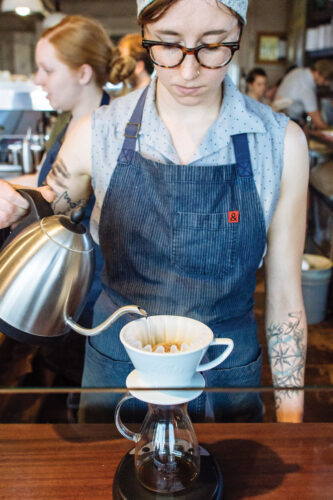
Although Barista Parlor might have put Nashville on the specialty coffee map, the rise of specialty coffee in Nashville can be traced back to Crema, an understated café and micro-roastery just south of Nashville’s bustling downtown. Fifteen Hermitage Avenue once housed a diesel mechanic shop, but thanks to an expansive deck, the space feels more like a remodeled house, albeit one with a view of an NFL football stadium. The recently revamped interior is a warmer, more inviting take on the industrial-chic aesthetic. It’s contemporary, but doesn’t shy from the third-place identity once synonymous with specialty coffee. Even with the deck, seating is a precious commodity at Crema, and it’s not uncommon to nurse the first sips of your beverage while you wait for a table to open. Whether it’s the Vanderbilt and Belmont students buried in their books or the nationally known musicians trying to grab a cup of coffee under the radar, it’s a diverse group that crowds into the space.
Over the last eight years Crema has quietly accumulated an array of awards, including two second-place finishes at the Specialty Coffee Association of America’s Roasters Choice competition. But owner and founder Rachel Lehman downplays the accolades. “I was just a barista who wanted to do something better,” Lehman says.
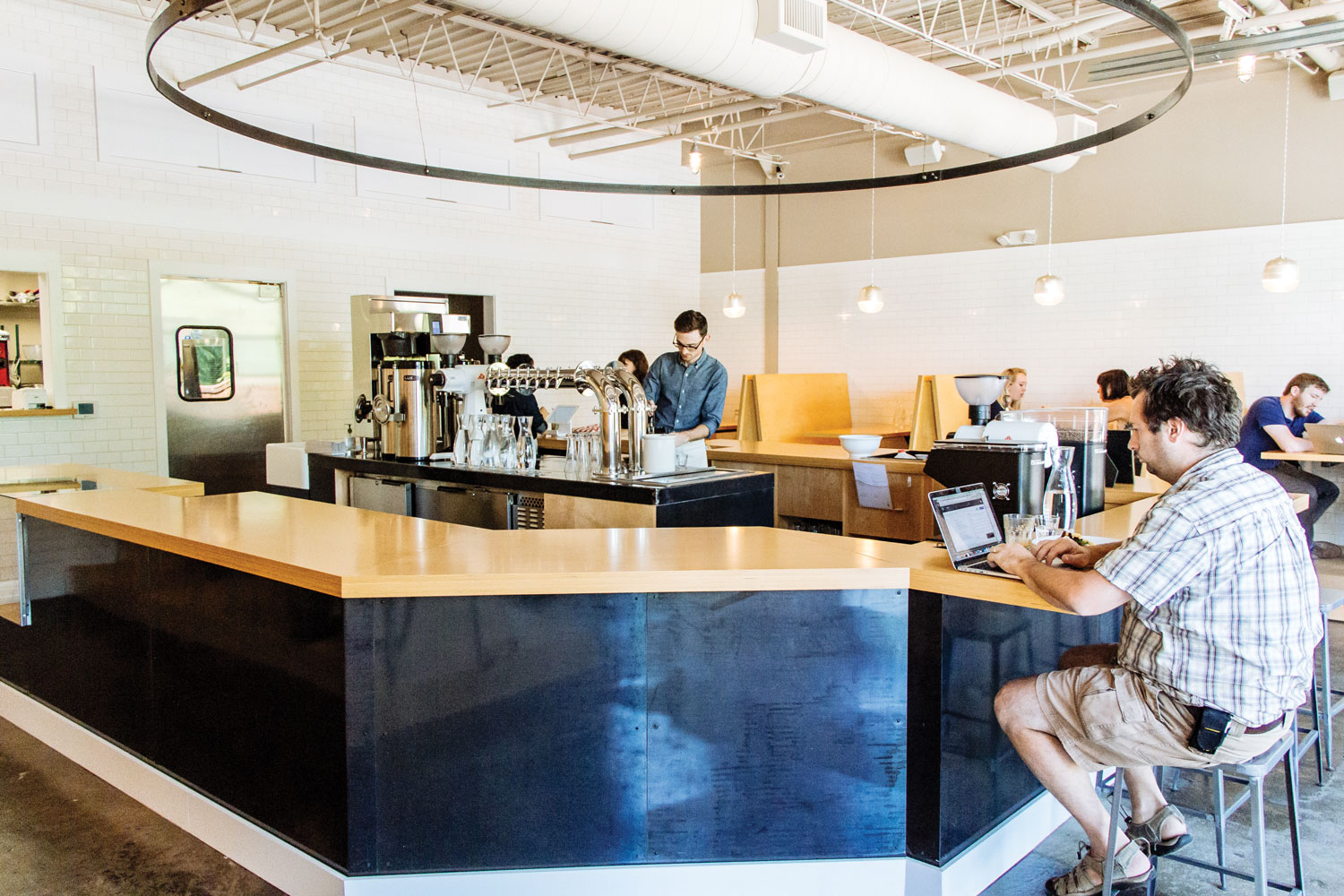
Lehman began working in coffee when she was fifteen years old. What was at first just a high school job became a way to get through college in Colorado. After moving to Nashville to marry her husband, Ben, she began to consider it a career. “I really enjoyed the hospitality side of the business,” says Lehmen. She quickly found, however, that her interest in coffee quality exceeded that of her employers. “I felt like I was just treading water.”
“We were the first people to have different price points for coffee,” says Lehman. “People didn’t understand there were different qualities.”
After a rejected bid to buy an existing café, Lehman decided to start from scratch. Lehman found the space on Hermitage Avenue and recognized its potential: it was conveniently situated between downtown and the interstate and sufficiently distant from any other cafés. The Lehmans renovated the space themselves, and Crema opened its doors in 2007. The young business, however, struggled to find a coffee supplier that met its needs. Local roasters were not up to Lehman’s exacting standards and companies outside the region were reluctant to ship their coffee to Nashville. “A lot of our education came online,” says Lehman. “I learned latte art by watching videos.”
Everything changed after a chance encounter with Aaron Blanco, the owner of San Antonio’s Brown Coffee. Lehman was impressed by the caliber of Blanco’s direct-trade coffee and Crema became a Brown wholesale account. Equipped with a higher standard of specialty coffee, Lehman set out to change Nashville’s perception of coffee. “We were the first people to have different price points for coffee,” says Lehman. “People didn’t understand there were different qualities.”
That pursuit of quality eventually led Crema to purchase a Diedrich IR-12 coffee roaster and start roasting their own beans in 2012.
“I have one foot in the roasting room, one foot in the shop,” says Lehman. “I enjoy roasting, but it’s hard as an owner because you really have to focus.” Despite the busy schedule, Lehman still works a weekly bar shift to stay connected with her customers. “She knows almost everyone’s name,” says barista Jessica Pesut.
“Our roots are being small and intentional,” says Ben Lehman, Rachel’s husband and business partner. Crema aspires to source eighty percent of their coffees through direct-trade relationships, a goal they are on track to meet in 2015. “The kind of coffee we like you can only get when you meet farmers. Then they introduce you to other farmers and it kind of snowballs,” says Rachel.
“I would love to see Nashville become an example to other cities in the South and all over the country about how a city can work together to create a strong industry and even stronger community.”
The investment in direct-trade relationships is already paying off. Recently, one of Crema’s partners, Luis Alberto Monge, discovered a natural mutation on his farm in Costa Rica. He was surprised to discover the tree’s fruit tasted more like papaya than a typical coffee cherry. “I remember, while I was at his farm, Luis told me, ‘You have to taste this,’” says Harrison. “We stood there and just ate the fruit for a while.” The resulting harvest of this still unnamed variety yielded just over ten pounds of green coffee, but Crema suspected it would be special and arranged to buy all of it. Due to the limited quantities, the “papaya coffee” is only being offered as a single cup pour-over, paired with a truffle developed by a local pastry chef to complement the coffee’s unique flavor profile.
Crema partners with a variety of local wholesale partners, but is selective about who can buy their coffee. “We ask all of our chefs to do our training,” says Harrison. “We like local accounts because we can check in on them.” Crema’s wholesale partners include their down-the-street neighbor, Husk, a James Beard Award–winning restaurant from chef Sean Brock, and the Lehman’s favorite restaurant, Prima. “It’s great to get a great meal and a really good cup of coffee afterward,” says Ben.
The entire team at Crema is adamant their success is tied to the character of the local community. “In Nashville, being a little isolated, you have a little more space to be creative and collaborative,” says Harrison. The team at Steadfast agrees with the sentiment. “This is where the success of Nashville lies. We’re all going to each other’s shops. We’re all supportive of each other,” says Cunningham.
This collaborative culture is behind a new organization, the Nashville Coffee Collective. “In the summer of 2014, I realized that the coffee community in Nashville had grown to a point where it was hard to keep up with everything that was going on,” says Patrick Rush, who manages Bongo Java’s café–ice cream shop hybrid Hot & Cold. Rush formed the NCC in partnership with representatives of other coffee companies around Nashville. “Our mission statement is to raise the profile of specialty coffee in Nashville,” says Rush. So far, the NCC has organized educational events and latte art contests, all for the purpose of connecting coffee professionals. “I would love to see Nashville become an example to other cities in the South and all over the country about how a city can work together to create a strong industry and even stronger community,” says Rush.
Heath Henley, co-owner of Dose Coffee and Tea, sees another component to the community’s strength. “The Nashville coffee community, many of whom are coincidentally connected to the music scene as well, intuitively understands the endless pursuit of perfection,” says Henley. His Antipodean-inspired café serves Counter Culture Coffee and house-baked pastries on Nashville’s westside. Like Barista Parlor did last year, Dose is expanding to a second location. “It is clear that Nashville is growing quickly,” says Henley, “I think that there will be plenty of opportunity here for a long time to come for those who do it right.”
— Michael Butterworth is a barista and writer based in Louisville, and co-founder of The Coffee Compass. Ari Zadai is a freelance photographer based in Nashville.

